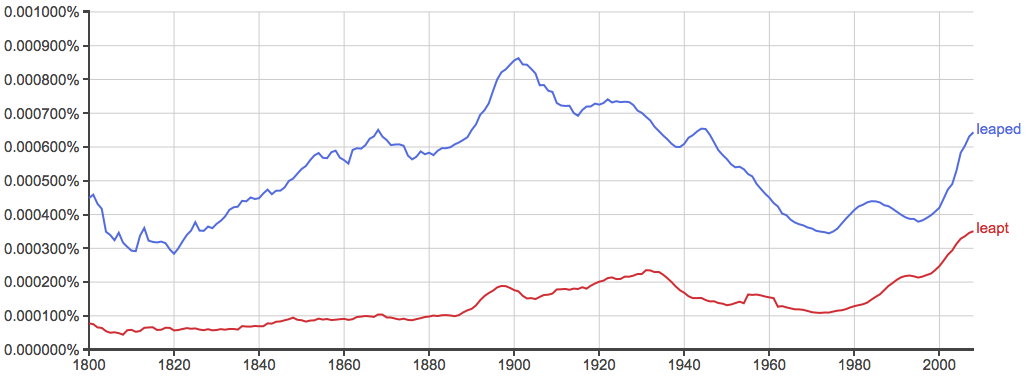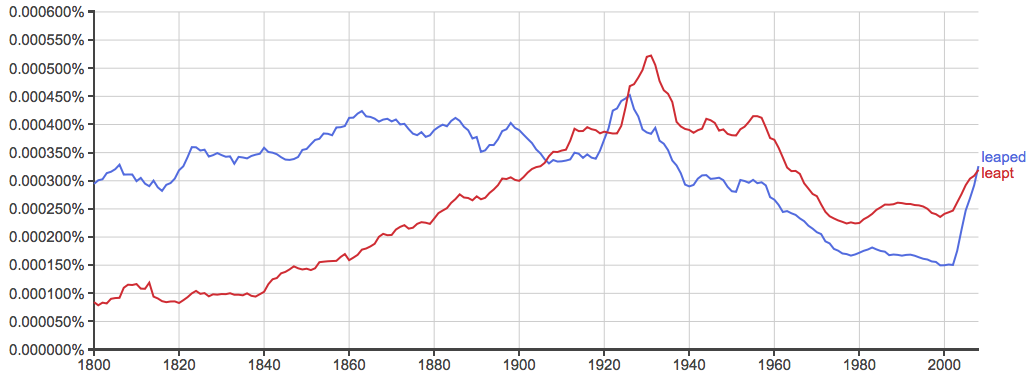There are many words in English that have more than one spelling. Leaped and leapt are two such words.
They are both past tense conjugations of the same verb, but one is preferred in American English, while the other is preferred in British English.
Continue reading to discover whether you should use leapt or leaped in your writing, depending on your intended audience.
What is the Difference Between Leapt and Leaped?
In this post, I will compare leaped vs leapt. As part of this comparison, I will use each spelling in a sentence to demonstrate its proper context. I will also reveal a useful mnemonic that will help you keep these words straight in your mind.
When to Use Leaped
 What does leaped mean? Leaped is the past tense form of the verb leap, which means to jump, hop, or otherwise move quickly. It can be used in a literal as well as a figurative sense.
What does leaped mean? Leaped is the past tense form of the verb leap, which means to jump, hop, or otherwise move quickly. It can be used in a literal as well as a figurative sense.
For example,
- The second graders leaped out of their seats and ran to recess.
- Mulling over the clues in his head, Detective Schwarber leaped to a startling conclusion.
- Sensing the tide of the argument turn against Kathleen, Gloria leaped to her defense.
- Last April, in a match against FC Porto, he leaped so violently into the air that he ripped open his pants. –The Wall Street Journal
Leaped is pronounced so that it rhymes with the words reaped, peeped, and beeped. It has been the preferred spelling in American English since the 18th century.
When to Use Leapt
 What does leapt mean? Leapt is also the past tense form of the verb leap. It can be used in any of the same contexts as leaped.
What does leapt mean? Leapt is also the past tense form of the verb leap. It can be used in any of the same contexts as leaped.
For example,
- Hearing his name called, Tommy leapt to the front of the bagel line.
- Jeremy leapt to the aid of his teammates in the video game.
- I suddenly leapt to the conclusion that all of this was futile.
- Amongst new car sales diesels leapt from less than 20% (around zero in Thessaloniki) to over 60%, but, so far, economic pressures have reduced traffic volumes averting a possible deterioration in air pollution. –The Guardian
Leapt is pronounced so that it rhymes with the words stepped, crept, and prepped. It was the preferred spelling in British English in the 20th century, but leaped appears to be gaining even in Britain.
Common Errors Using Leapt
A quick note on leapt, it is as spelled. It should never be spelled lept. Lept is not a real word. Spelling leapt this way is always a spelling error.
Trick to Remember the Difference
Leaped and leapt are alternative spellings (and pronunciations) of the same verb. According to the Bryan A. Garner (2016), “both are acceptable” (p. 555) in all situations. It strikes this author that sometimes leapt sounds more natural, and sometimes leaped would be a better choice, depending on the phrase. When searching for the past tense of leap, your ear should be your guide.
In any case, the following charts show that leaped has been the more common term in American English since at least 1800, whereas leapt overtook leaped by a narrow margin in British English around the turn of the 20th century.


These charts aren’t scientific or precise, since they only examine books written in English since 1800. Still, given the insight they provide, it would be wise to choose leaped for American audiences and leapt for British audiences.
One easy way to keep these usages straight in your mind is to remember that the British version is spelled with a T, and the British love their tea.
Summary: Leaped vs. Leapt
Is it leaped or leapt? Both leaped and leapt are past tenses of the verb leap, which means jump or hop.
- Leaped is more common in American English,
- Leapt edges it out in British English since the early 1900s.
Since leapt and tea are both spelled with a T, and the British drink a large amount of tea, it should be easy to remember that leapt is more common in British English.
If you still need help choosing leaped or leapt, you can always review this article to jog your memory.
Contents
